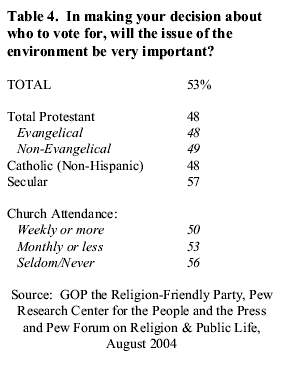
In contrast to abortion, gay marriage and other hot-button cultural issues, which divide most religious groups in the United States, there is a fairly strong consensus across faith traditions on environmental policy, according to recent polls sponsored by the Pew Forum on Religion & Public Life. Nevertheless, conservative Christians and some minorities are not quite as supportive of environmental regulations as are others.
As Table 1 shows, by a two-to-one margin (55% to 27%) respondents back strong regulations to protect the environment. Furthermore, the level of support is quite deep. Respondents in this survey were asked whether they favored stronger environmental regulations “even if they cost jobs or result in higher prices.”
Backing for the environment cuts across virtually every religious group, from white Evangelicals to Jews. Moreover, as Table 2 indicates, that support has remained strong through the last few presidential election cycles. A major exception to this generally strong pro-environment orientation is Black Protestants, who are evenly divided on the issue.

Support among African Americans for environmental regulations is the lowest of any group, and in fact has declined slightly since 1992. Although a plurality of Latino Catholics (47%) and Latino Protestants (43%) favor laws to protect the environment, support in these communities also is significantly lower than for the population at large. The more tepid level of support in all three minority groups may reflect a greater preoccupation with more immediate economic and social welfare concerns, possibly including a fear that more stringent environ-mental regulations could jeopardize jobs.
[For a complete explanation of the beliefs and behavior measures used to classify respondents into the three groups, see page 7 of Religion and the 2004 Election: A Pre-Election Analysis]

As Table 3 illustrates, the traditionalist-modernist gap on environmental policy is just one piece of a much greater divide over public policy priorities. Generally, traditionalists give greater weight to cultural issues like abortion and gay marriage; modernists tend to focus more on economic and social welfare issues, such as government programs to help the poor.

The Environment as a Priority
A good way to judge the intensity of peoples’ views on issues is to look at their voting priorities. As Table 4 shows, slightly more than 50 percent of voters consider the environment to be a very important issue when they go to the polls. The figures again are largely the same across the religious spectrum, with roughly half of voters in each major religious group seeing it as a very important issue during elections. A similar distribution occurs when the survey sample is broken down by frequency of church attendance. In both cases, secular and non-church going respondents give the issue a slightly higher priority than everyone else.
For most Americans, then, protecting the environment is an important issue. But as Table 5 shows, it is not as important an issue as some other policy concerns. Issues like terrorism, the economy, health care and education are much more important to voters across the religious spectrum. For all but white Evangelicals, however, the environment rates higher than cultural issues such as abortion and gay marriage.

Download this Fact Sheet (76K .pdf)




